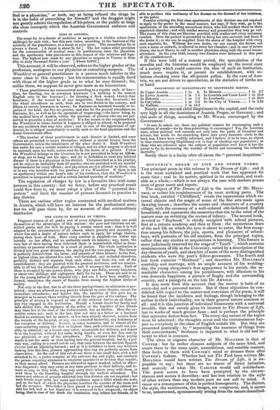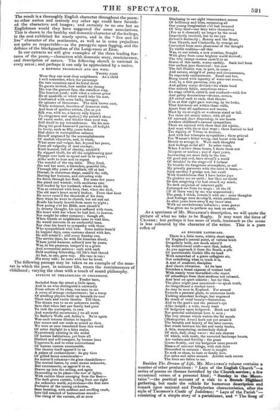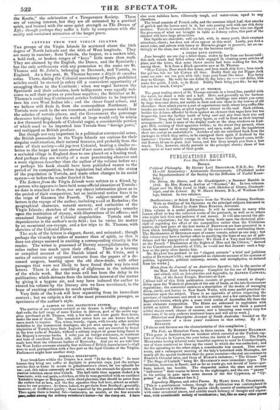MOULTRIE'S DREAM OF LIFE AND OTHER POEMS. THE principal poem
in this volume is The Dream of Life: and it is the most sustained and poetical work that has appeared for some time ; real in its matter, spirited in its execution, and read- able as a whole,—which is not always the case with modern poems even of great merit and repute. The subject of The Dream of Life is the career of Mr. MOUL- TRIE, or rather his reminiscences of its most striking parts. The first book, entitled " Chili:1110°d," recals the impressions which ex- ternal objects and the magic of some of the fine arts made upon dawning reason ; describes the scenes and characters of a country village, with the economy of a well-ordered old-fashioned English household; and represents the memories that rise to the mind of the mature man on revisiting the scenes of infancy. The second book, devoted to "Boyhood," is chiefly occupied with school pictures, first at a private academy and then at Eton : the mysterious fears of the new life on which the tyro is about to enter, the first recep- tion among his fellows, the joys, sports, and pleasures of school- boys, with portraits of his old masters, form the principal topics, rather than any studies or acquisitions in learning. This feature is more judiciously reserved for the stage of" Youth " ; which contains reminiscences of life at the University, varied by a description of the day-dreams of youth, and sketches of some of the more distinguished students who were the poet's fellow-gownsmen. The fourth and last book contains " Manhood" ; and describes Mr. MOULTRIE'S courtship and marriage, with an ample account of his wedding- day, the young clergyman's first appearance in his parish, the re- markable characters among his parishioners, with allusions to his own domestic happiness, a picture of Rugby and the surrounding country, and a panegyric on the late Dr. ARNOLD. It may seem from this account that the matter is both of an every-day and a personal nature. But if these objections be con- sidered with regard to the matter and execution of the poem, it will be found that the incidents and feelings, though belonging to the author in their individuality, are in their general nature common to all : and it is this junction of individual lineaments with a universal breadth, that not merely gives its interest to The Dream of Life, but to works of much greater fame ; and is perhaps the principle that separates fiction from fact. The every-day nature of the topics must be admitted : the thoughts occur and the circumstances hap- pen to everybody in the class of English middle life. But they are presented poetically : by " separating the essences of things from their concomitants,' freshness is imparted to what is old and in- terest to what is common.
The class or cognate character of Mr. Mouvrarn is that of COWPER : but he rather chooses subjects of the same kind, and treats them in the same quiet, unambitious, and sensible manner, than looks at them with COWPER'S mind or dresses them after Cowrna's fashion. Whether had not The Task been written Mr. MOULTRIE would have written The Dream of Life, it is im- possible to say ; but there are no traces of direct imitation, and scarcely of what Mr. CARLYLE would call indebtedness. The poem seems to have been prompted by the circum- stances and scenes it describes ; and has less relation to the style of other writers than any modern poet we can call to mind. A cause or a consequence of this is perfect homogeneity. The diation, the style, the sentiments, the images, are congruous, and, it seems to us, unborrowed, spontaneously arising from the nature described. The result is a thoroughly English character throughout the poem: no other nation and scarcely any other age could have furnish- ed the characters and images; and certainly to no one but an Englishman would they have suggested the same associations. This is shown in the healthy and domestic character of the feelings, in the zest exhibited for manly sports, and in the "live and let live" character of the sentiments, as well as in some prejudices not quite so respectable—as the panegyric upon fagging, and the defence of the blackguardism of the Long-room at Eton.
In our extracts we will give examples of the three leading fea- tures of the poem,—characters with domestic story, reminiscence, and description of nature. The following sketch is national in every sense ; and perhaps it can only be appreciated by a native.
A RETIRED TRADESMAN AND HIS WIFE.
Twenty years Were they our next-door neighbours. As a child I well remember, when the parsonage On rare occasions oped its festal doors To guests invited, how amidst the throng His was the gravest face, the stateliest step, The hoariest head; with what a solemn grace Be at quadrille or whist would take his seat, Confronted with some bulky dowager, Or spinster of threescore. The dark brown coat, White waistcoat, breeches of demurest drab, And hose of spotless cotton, (for as yet Silk was, with us, a luxury only known To clergymen and squires,) the polish'd shoes Of rustic make, and thicker than need was, Still dwell in my remembrance. On his arm Hung his good-humour'd partner, all bedight In finery, such as fifty years before Had shone in metropolitan saloons.
Herself ungraced by the accomplishments Of modish education, and, in truth, What some call vulgar, but, beyond her peers, From all vulgarity of soul exempt; Kind-hearted, full of charity, unchill'd By niggard thrift, for all the neighbouring poor Prompt ever both to spend and to be spent ; Alike unfit to bear and to repeat The scandal of the tea-table. They lived,
She and her mate, a blameless, peaceful life,
Through fifty years of wedlock, till at last Disease, in cancerous shape, assail'd the wife, Marring her features, and extending wide Its fibres through her flesh. For some few years She pined and wasted ; with assiduous care Still tended by her husband, whose whole life • Was so entwined with hers, that, when she died, The old man's heart seem'd broken. From that hour He never cross'd the threshold of his door, Save when he went to church, but sat and sat Beside his lonely hearth from morn to night ; Now poring o'er his Bible, now absorb'd
In dreamy thought, his eyes suffused with tears,
His heart with her whom be had lost, in heaven.
Nor sought he other company; though oft, When friends or neighbours came to visit him, He would converse in no uncbeerful tone, Nor close his heart to sympathy with those Who sympathized with him. Some habits form'd In happier days, some customs shared with her, He still retain'd : still every Sunday eve, The service done, he with his kinsman dined; Whose jovial humour, soften'd now by years, Was, in his presence, temper'd to a grave And reverential sadness: each with each Held soothing fellowship, till life's frail thread At last, in one, gave way. Hie race is run ; His story told ; be rests with her beloved.
The following passage may be taken as an example of the man- ner in which the poet, in maturer life, treats the reminiscences of childhood ; varying the close with a touch of sound philosophy.
EFFECTS OF THEATRICALS IN CHILDHOOD.
Yonder barn, Secluded from the street a little space, And in no wise distinguish'u outwardly From others of its class, was once to me A scene of strange enchantment ; furs troop Of strolling players built up beneath its roof Their rude and rustic theatre. Till then, The drama was to us an unknown world, Save that when last our family had gone To visit the metropolis, (a rare And wonderful occurrence,) we all went To Sadler's Wells and Astley's. Ne'er again Was such intense illusion to beguile Our senses and our souls as seized us then.
We were at once translated front this world Of sober daylight to a fairy realm, Mysteriously existing in the midst Of human habitations, yet from all Distinct and self-compact, by human laws Ungovern'd, and to rules conventional Of human custom unamenable.
The theatre itself appear'd to us A palace of enchantment : its gay tiers
Of gilded boxes semicircular— Its mirror'd columns—its glass chandeliers—
The central lustre, by some means unknown,
But necromantic, as appear'd to us,
Drawn up into the ceiling, and again Descending to its place—the row of lights,
With sudden blaze emerging from the floor—
The dark green curtain, veiling from our sight An unknown world, mysterious—the first note Prelusive of the tuning orchestra, Soon bursting, with sublime and swelling crash,
Into full concord of harmonious sound—
The rising of the curtain, all at once Disclosing to our si4ht transcendent scenes Of brilliancy and bliss, surpassing all Our young imagination e'er had dreamed Of fairy-laud—our fairy tales themselves (For so it chanced) no longer by the mind
Imperfectly received, but to the eye
Reveal's' distinctly ; Beauty and the Beast, Tom Thumb, and Cinderella, by strange art Converted from mere phantoms of the thought To visible realities—all this Was, to our minds, a new creation, fraught With glory from some brighter world derived; The very orange-women seem'd to us Scarce of this earth, scarce earthly. Such had been Our earliest joys theatrical : but now The full illusion was, in part, to cease ; And nature, stripp'd of pomp and circumstance, To supersede enchantment. Small and low, Hung round with tapestry of worn-out scenes, And, by a thin partition, into pit And gallery scarce divided—its whole band
One solitary fiddle, sometimes two—
Its stage cribb'd, cabin'd, and confined—with few And paltry decorations—dresses, scenes, All suited each to each, that theatre E'en at first sight gave warning, by its looks, That histrionic art within those walls, Apart from all appliances and means, Must by its strength or weakness stand or fall. Yet there did mimic talent, with all aid • Of outward show dispensing, in our hearts Awaken childhood's earnest sympathies.
There we rejoiced with them that did rejoice, And wept with them that wept ; there learned to feel The dignity of Virtue in distress, And with her triumphs sympathize ; there grieved For Woman's bitter wrong, and burnt with zeal Heroic to avenge it. Were such thoughts • And feelings sinful all? In sober truth, When I review those hours, I deem them not Misspent or useless ; and if riper years, Instructing me more fully in the lore Of good and evil, have reveal'd a world Of mischief in the stage—if I forbear To breathe its dangerous atmosphere, or soil
My priestly garments with the taint it bears,— Such sacrifice I grudge not, but exult
With thankfulness that I have better joys To gladden me on earth: but then no doubt Or dim misgiving e'er had crosed my mind; No dark suspicion of inherent guilt Estranged me from its magic: all the ill (If ill there was) by me was unperceived ;
The good, I think, remain'd with me : some thoughts
And feelings were develop'd, which perchance In after years have sway'd my inner man With no unwholesome influence; some power Was given me to perform my task on earth.
As a specimen of Mr. MOULTRIE'S description, we will quote the picture of what we take to be Rugby. It may want the force of CEABBE; but perhaps it has more of truth, inasmuch as the scene is less coloured by the character of the writer. This is a pure reflex of
AN ENGLISH LANDSCAPE.
There is a little town, within short space Of England's central point, of various brick Irregularly built, nor much adoni'd By architectural craft—save that, indeed, As you approach it from the South, a pile Of questionable Gothic lifts its head 'With somewhat of a grave collegiate air, Not unbefitting what in truth it is, A seat of academic discipline And classic education. At its base Stretches a broad expanse of verdant turf, With stately trees bestudded—the resort Of schoolboys from their studious toil released, And bent on sport athletic : but for this, The place might pass unnoticed—to speak truth, As insignificant a market-town As may be seen in England. Far around Extends a pastoral glade, to numerous herds Yielding abundant herbage, but uograced By much of rural beauty—featureless, And to the poet's and the painter's eye Alike insipid ; a wide, weary tract Of hedgerow upon hedgerow. Rock nor hill Nor graceful undulation here is seen ; The very stream which waters the fat meads (Shaksperian Avon) bath not yet attain'd The breadth and beauty of his later course, But winds between his flat and reedy banks, A thin, meandering, melancholy thread Of slow, dull, slimy water: the sole charms Of which, with truth, the unvaried landscape boasts, Are verdure and fertility : the grass Grows freshly, and the hedgerow trees present Masses of summer foliage, with rich tints Diversified in autumn : there is nought To seek or shun, to hate or fondly love. For miles and miles around. Amidst such scenes The lines are fallen to me.
Besides The Dream of Life, Mr. MOULTRIE'S volume contains a number of other productions : "Lays of the English Church"--EL series of poems on themes furnished by the Church service ; a few occasional verses of a personal kind; "Sunday in the Moun- tains "—the poetical account of a visit to a Scotch Highland gathering, but made the vehicle for humorous description and remark upon national and Presbyterian characteristics, after the style of THOMSON'S Cagle of Indolence; "Lays of the Parish"— consisting of a simple story of a parishioner, and "The Song of the Kettle," the celebration of a Temperance Society. These are of varying interest, but they are all animated by a poetical spirit, and treated with the same quiet strength as The Dream of Life; though perhaps they suffer a little by comparison with the reality and sustained attraction of the larger poem.




























 Previous page
Previous page